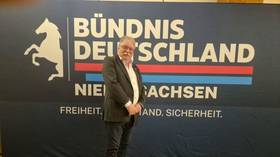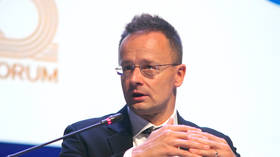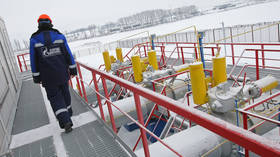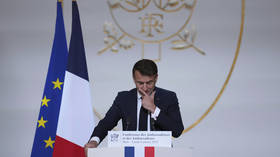Speculation grows that Austrian far-right leader
Herbert Kickl will be asked to form a government
Austrian President Alexander Van der Bellen on Sunday announced that he would meet with far-right politician Herbert Kickl as speculation grows that he will ask the Freedom Party leader to form a government.
Ursula must be rolling over in her sick-bed.
Van der Bellen made the announcement after meeting with Chancellor Karl Nehammer and others at his presidential palace.
Nehammer has announced his intention to resign after coalition talks between his conservative Austrian People’s Party and the center-left Social Democrats collapsed over the budget.
Nehammer has ruled out working with Kickl, but others within his party are less adamant.
Earlier Sunday, the People’s Party nominated its general secretary, Christian Stocker, as interim leader, but the president said Nehammer would remain chancellor for now.
In the past, Stocker has criticized Kickl, calling him a “security risk” for the country.
In its election program titled “Fortress Austria,” the Freedom Party calls for “remigration of uninvited foreigners,” for achieving a more “homogeneous” nation by tightly controlling borders and suspending the right to asylum via an emergency law.
The Freedom Party also calls for an end to sanctions against Russia, is highly critical of Western military aid to Ukraine and wants to bow out of the European Sky Shield Initiative, a missile defense project launched by Germany. The Freedom Party has also signed a friendship agreement in 2016 with Putin’s United Russia Party that it now claims has expired.
Kickl has criticized “elites” in Brussels and called for some powers to be brought back from the European Union to Austria.
This weekend, Van der Bellen said that he had spent several hours talking to key officials, after which he got the impression that “the voices within the People’s Party who exclude working with the Freedom Party under its leader Herbert Kickl have become quieter.”
The president said that this development has “potentially opened a new path,” which has prompted him to invite Kickl for a meeting on Monday morning.
Kickl’s Freedom Party topped the polls in the autumn’s national election with 29.2% of the vote, but Van der Bellen tasked Nehammer with putting together a new government because no other party was willing to work with Kickl.
That decision drew heavy criticism from the Freedom Party and its supporters, with Kickl saying in October that it was “not right and not logical” that he did not get a mandate to form a government.
“We are not responsible for the wasted time, the chaotic situation and the enormous breach of trust that has emerged,” Kickl said Sunday afternoon on social media. “On the contrary: It is clear that the Freedom Party has been and continues to be the only stable factor in Austrian politics.”
Stocker addressed reporters on Sunday afternoon and confirmed that he had been appointed “unanimously” by his party to serve as interim leader. “I am very honored and happy,” he said.
He also welcomed the decision by the president to meet with Kickl and said that he now expects that the leader of the party that emerged as the clear winner from the last election would be tasked with forming a government.
“If we are invited to negotiations to form a government, we will accept this invitation,” Stocker added.
Austria was thrown into political turmoil on Friday after the liberal party Neos pulled out of coalition talks with the the People’s Party and the Social Democrats.
On Saturday the two remaining parties, who have only a one-seat majority in Parliament, made another attempt to form a government — but that also ended in failure after a few hours, with negotiators saying they were unable to agree on how to repair the budget deficit.
German politician in hot water over
sexual comments to models

German politician Bernd Vogel has landed himself in hot water over his steamy activities on social media. Less than two months before the snap parliamentary elections in Germany, the 75-year-old was apparently spending his time posting lewd comments under photos of scantily clad models, using his primary account on social media platform X.
The news about the politician’s controversial deeds spread on X over the weekend, some users wondering if the politician was aware that his comments were public and visible to everyone on the social network. Dozens posted screenshots of his comments under the models’ photos.
Some commenters also said that they could not “take a party seriously” if its members were acting like this. Others jokingly noted that, in democracy, politicians do what their voters ask them to do and Vogel demonstrated “exemplary” conduct in this regard since he was allegedly responding to provocative statements by models themselves.
Vogel represents a small party called ‘Alliance Germany,’ which until recently only had a few representatives in the regional parliament of the German city state of Bremen. In 2024 it acquired some representation in the federal parliament after a former Alternative for Germany (AfD) member left his party and joined Alliance Germany while still a member of the Bundestag.
The politician was still expected to run for parliament at the upcoming early elections in late February. After his spicy activities got traction on social media, his party distanced itself from Vogel, accusing him of sexism.
Following public outcry and a reprimand from his party, Vogel took to X to apologize for what he called “stupid posts.” He also announced that he was withdrawing his candidacy from the party election list and would also not run as a candidate in any of the single-seat constituencies.
========================================================================
Hungary blames Ukraine for rising gas prices in EU

Hungarian Foreign Minister Peter Szijjarto has blamed rising natural gas prices in the EU on what he described as “artificially reduced supply.” In a Facebook post on Tuesday, he attributed the increases to EU sanctions and to Ukraine’s decision to block the transit of Russian gas to Central Europe.
Ukraine refused to extend its pipeline transit contract with Russia’s Gazprom beyond the end of 2024, cutting off the flow of natural gas from Russia to Romania, Poland, Hungary, Slovakia, Austria, Italy, and Moldova. The decision caused EU gas prices to spike to €50 per megawatt hour, a figure unseen since October 2023.
Szijjarto emphasized that the higher gas prices have undermined the bloc’s competitiveness and have disproportionately burdened its citizens. “Ukraine is trying to join the EU as a candidate, it has once again put the European economy in a more difficult position with its latest decision,” he pointed out.
He also criticized Kiev for breaching its EU Association Agreement by stopping transit shipments. “Ukraine’s decision to stop transit shipments will lead to further price increases and create new competitiveness challenges for Central Europe and the European Union as a whole,” Szijjarto warned.
“Since the end of the Ukrainian transit route in mid-December, natural gas prices in Europe have risen by 20%,” he said.
Budapest’s efforts to diversify gas supply routes have nonetheless secured the country’s energy needs, despite price increases, the minister said, explaining that the country’s investment in the Turkish Stream pipeline, which bypasses Ukraine, was critical in ensuring stable supply.
“If we had succumbed to the ‘friendly’ pressure against the Turkish Stream years ago, we would now be in a very, very difficult position as a landlocked country,” Szijjarto said.
Gazprom, once the EU’s main gas provider, dramatically reduced exports to the bloc in 2022, following the imposition of sanctions against Russia and the sabotage of the Nord Stream pipelines, which brought gas directly to Germany.
Russia officially stopped supplying gas to the EU through Ukraine as of January 1, after months of negotiations to extend the transit deal with Kiev fell through. Moscow repeatedly said it was willing to extend the transit deal and continue deliveries through Ukraine beyond 2024.
Russian President Vladimir Putin accused Kiev of “punishing” the EU with its decision, which he said would lead to higher energy prices. At his annual press conference on December 19, Putin stated that the halt to this gas transit, however, would have little impact on Russia.
=======================================================================
Georgian PM accuses Macron of lying

Georgian Prime Minister Irakli Kobakhidze has said claims by French President Emmanuel Macron that Russia meddled in Georgia’s recent election are “lies.”
On Monday, Macron declared that “Russia has increased its aggression and shifted the nature of its hostility toward Europe and other regions” by, among other things, “destabilizing electoral processes and manipulating ballot boxes” during the October election in Georgia. He did not provide evidence to back his allegation.
Kobakhidze was asked about Macron’s claim by journalists on Tuesday, and responded: “I cannot comment on lies. I am commenting on the problem that everyone faces today, which is a devastated Ukraine.”
“The French president should better follow the events in Ukraine, which has been sacrificed with the aim of destroying it,” the prime minister stressed.
The parliamentary election, held on October 26, ended with the ruling Georgian Dream party winning 53.93% of the ballot and taking 89 out of 150 seats in the legislature.
The results of the vote were recognized by the Organization for Security and Cooperation in Europe (OSCE). The head of OSCE’s monitoring mission at the Georgian election, Pascal Allizard, said that despite “a divisive campaign atmosphere” and imbalances in financial resources between the parties, “the engagement shown on election day – from the active voter participation, robust presence of citizen and party observers, and rich diversity of voices – gives the sign of a system that is still growing and evolving, with a democratic vitality under construction.”
Georgia’s four pro-EU opposition parties, which passed the 5% threshold, have claimed the election was rigged and refused to recognize its outcome. Tbilisi has been gripped by a wave of protests since the vote, with rallies turning violent at times. The scale of the demonstrations has been subsiding in recent weeks.
Rest assured, George Soros has his fingers in that pie, somewhere.
Brussels prosecutor: Toxic powder sent to Belgium prime minister's office was strychnine
Jan. 9 (UPI) -- The Brussels public prosecutor's office said Wednesday a staff member was injured after coming in contact with toxic powder containing strychnine sent to Belgian Prime Minister Alexander De Croo's office in November.
The powder was sent to De Croo's office as well as the Interior Ministry and the State Security Headquarters Nov. 20. A similar letter with the toxin was found at the interior minister's office Dec. 9.
According to the prosecutor, the prime minister staff member had hand injuries after touching the powder and was taken to a hospital. No other injuries were reported.
An analysis of the powder discovered it contained strychnine, a toxic substance used for rodent control that can be deadly when ingested.
Related
The Brussels prosecutor's office said Wednesday evening that "no further information can be communicated at this time."
Two days before the news of the strychnine-laced letters was released, a man carrying a knife was arrested near De Croo's Brussels office. Police said the man's intent and motivation wasn't clear.
De Croo spokesperson Barend Leyts said a female staff member was injured when she opened a letter containing the powder.
"Obviously the incident has shocked the prime minister and his staff," Leyts said. "Our colleague is luckily doing well now and at the time all procedures were strictly followed to prevent further damage."
European elected leaders have faced an increase in violence and threats, including an assassination attempt against Slovakia Prime Minister Robert Fico last year and an attack on Denmark Prime Minister Mette Fredericksen in Copenhagen that injured her head, neck and shoulder.
Fico was shot five times but survived after more than three hours of surgery. Officials called it a "politically motivated" attack.
In 2022 Belgium's then-justice minster Vincent Van Quickenborne was put under increased security when a kidnap plot against him was discovered.
A car with guns and bottles of gasoline inside was discovered near Quickenborne's home.
The Council of Europe issued a 2023 warning that violence against local and regional elected representatives was rising.
Gee, ya think?








No comments:
Post a Comment